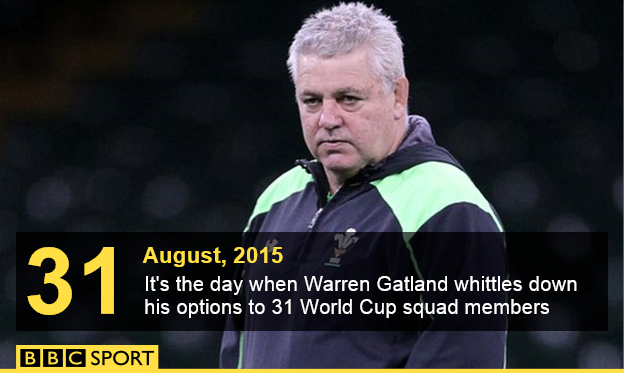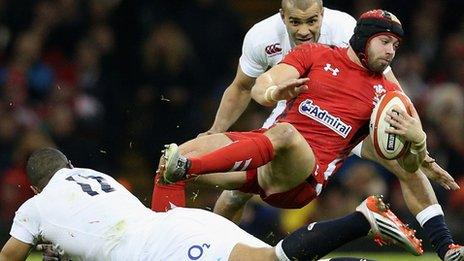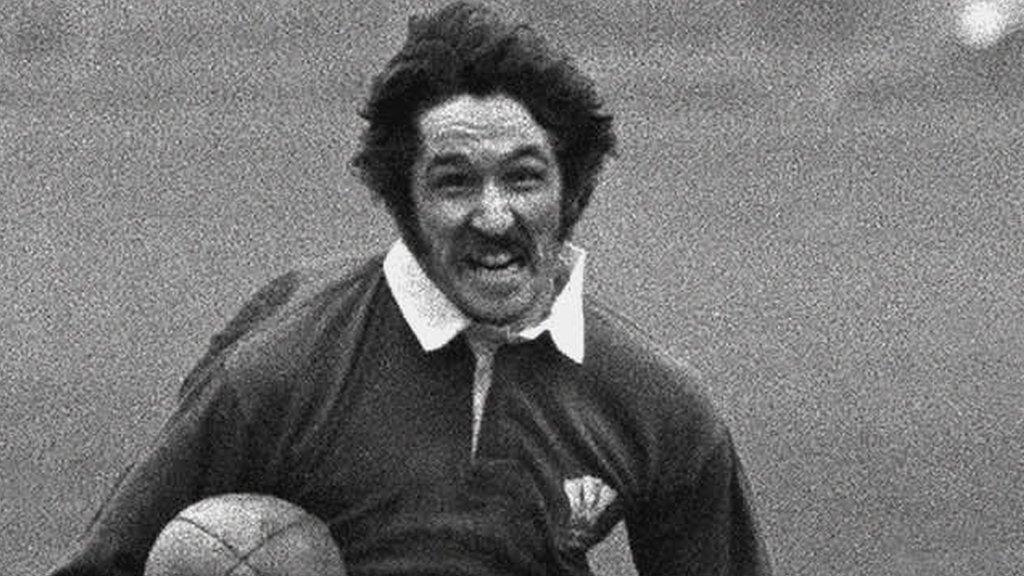Rugby World Cup: Alpine agony as Wales start build-up
- Published
'Toughest' camp for Wales players says forwards coach Robin McBryde
Ahead of the 2015 Rugby World Cup, Wales' 47-man squad are living at more than 2,000m altitude in a Swiss ski resort.
But with green grass underfoot and searing heat, the players are certainly not on a two-week ski holiday in Fiescheralp.
They wake each day at dawn before dropping 1,000m to the base village of Fiesch for a brutal training schedule.
Yes, it's an Alpine camp in preparation for a World Cup that will be played at sea level. But the boffins are convinced it's the blueprint for success.
What a change since 1987

Jamie Roberts and his Wales team-mates are going through a gruelling fortnight of training in the Alps
The Wales squad of 1987 prepared for the inaugural World Cup with a long weekend in Tenby.
Three days in Pembrokeshire compared to a three-month camp that will take the players from Alpine peaks through Arabian deserts to remote Polish forests.
The cosy innocence of the amateur game has been replaced by the hard-edged realism of professional science.
Most of the squad have been to Poland before. Spala's centre of excellence has been a popular destination with the Welsh management (less so for the players) since it was introduced ahead of the 2011 World Cup.

Jamie Roberts and George North go head-to-head in the shadow of the Alps
It provides scientific excellence - including the infamous cryotherapy chambers - and is devoid of any distractions, be it families, tempting treats or other extracurricular activities.
The dry city of Doha in Qatar will also keep the players on the straight and narrow.
It will be the next stop after Switzerland where the players will train in temperatures of 40C-plus and will sleep in specialised chambers replicating conditions of over 4,000m above sea level.
Alpine joys
Fiesch exists for sport. Functional cable car stations contrast with the quaint Alpine architecture of the rest of the village.

Rhys Priestland and Hallam Amos tussle in training
In the summer, the ski racks are full of mountain bikes and hiking poles as tourists and adrenaline junkies head up the mountain for their next thrill.
The rugby players, however, are going in the opposite direction.
Captain Sam Warburton's vertigo is severely tested as the players take the daily shuttle down to the village to begin their gruelling day.
Living at a height of between 2,000m and 2,500m is believed to improve performance at sea level, and it is for this reason that the squad is based up the mountain while the training is conducted further down the valley.
And there's a new drill instructor barking the orders in Paul Stridgeon, who is combining that role with his work for European champions Toulon.
He is well known to many of the players from his time with the British and Irish Lions. The others also now know all about him.
Conditioning is key

Gone are the days of old when Wales were physically and conditionally inferior to the other elite nations.
With 13 weeks of preparation followed by the competition itself, coach Warren Gatland will have over four months to mould his World Cup winners.
It will be difficult to use conditioning as an excuse should things not go to plan.
With Australia and England in Wales' World Cup group, getting to the quarter-finals will be a challenge in itself and the success of these training camps will ultimately be judged by the results on the pitch.
From a lush green field in Fiesch the task ahead seems as daunting as the imperious mountains that keep watch on the training sessions.
Perhaps, years from now, the players will reflect on the beauty of their venue. After all, physical pain is only temporary.
- Published6 July 2015

- Published6 July 2015

- Published4 July 2015

- Published14 September 2016

- Published25 August 2011
